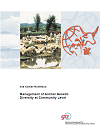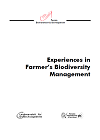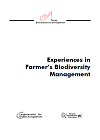Domestic animal diversity in developing countries is embedded in traditional farming and pastoral communities who manage their livestock according to their indigenous knowledge (IK) and in tune with local ecological constraints. Especially in marginal environments, local livestock breeds are crucial for sustaining rural livelihoods by producing a wide range of products while requiring relatively low levels of input with regard to fodder, management and health care. Thus their maintenance is ecologically more sustainable and they entail a lower work load for women in comparison with improved breeds. However, economic forces of globalization as well as political backing for crossbreeding with exotic breeds, among other factors, have already resulted in the disappearance of a large number of these breeds and many more are threatened.
Maintenance of the remaining livestock genetic diversity as mandated by the Convention on Biological Diversity (CBD) requires a wide range of general policy changes as well as specific initiatives. Activities that can be carried out within the framework of technical cooperation include, at grassroots level, support for research into IK and NGO capacity building and, at the national level, a reorientation from crossbreeding with exotic breeds to the development of local breeds by selection, the training of relevant agencies in participatory techniques, consideration of local livestock in land use and regional development planning, as well as the creation of a positive marketing environment. At an international level, a scrutiny of subsidies and support for crossbreeding is called for and intellectual property protection must be extended to farming and pastoral societies that have created unique breeds.
 Title: Management of animal genetic diversity at community levelAuthor: Ilse Köhler-Rollefson / Deutsche Gesellschaft für Technische Zusammenarbeit / 2000Description: Domestic animal diversity in developing countriesFormat: ZipPages: 17Download document
Title: Management of animal genetic diversity at community levelAuthor: Ilse Köhler-Rollefson / Deutsche Gesellschaft für Technische Zusammenarbeit / 2000Description: Domestic animal diversity in developing countriesFormat: ZipPages: 17Download document



